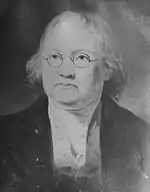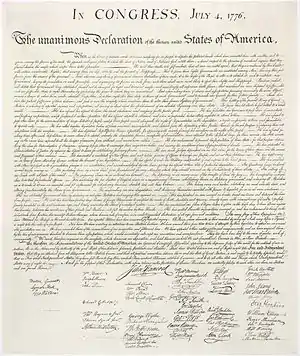William Ellery
William Ellery (December 22, 1727 – February 15, 1820)[1] was a signer of the United States Declaration of Independence[2] as a representative of Rhode Island. In 1764, the Baptists consulted with Ellery and Congregationalist Reverend Ezra Stiles on writing a charter for the college that became Brown University. Ellery and Stiles attempted to give control of the college to the Congregationalists, but the Baptists withdrew the petition until it was rewritten to assure Baptist control. Neither Ellery nor Stiles accepted appointment to the reserved Congregationalist seats on the board of trustees.[3]
William Ellery | |
|---|---|
.jpg.webp) Engraving of Ellery by Henry Bryan Hall | |
| 23rd Chief Justice of the Rhode Island Supreme Court | |
| In office June 1785 – May 1786 | |
| Preceded by | Paul Mumford |
| Succeeded by | Paul Mumford |
| Personal details | |
| Born | December 22, 1727 Newport, Colony of Rhode Island and Providence Plantations |
| Died | February 15, 1820 (aged 92) Newport, Rhode Island |
| Resting place | Common Burying Ground, Newport |
| Occupation | Lawyer |
| Known for | signer of the United States Declaration of Independence |
| Signature | |
Biography
William Ellery was born in Newport, Rhode Island on December 22, 1727,[2] the second son of William Ellery, Sr. and Elizabeth Almy, a descendant of Thomas Cornell. He received his early education from his father, a merchant and Harvard College graduate. He graduated from Harvard College in 1747, where he excelled in Greek and Latin. He then returned to Newport where he worked first as a merchant, next as a customs collector, and then as Clerk of the Rhode Island General Assembly. He started practicing law in 1770 at the age of 43 and became active in the Rhode Island Sons of Liberty.
Statesman Samuel Ward died in 1776, and Ellery replaced him in the Continental Congress. He became a signer of the Articles of Confederation and one of the 56 signers of the Declaration of Independence in 1776. The size of his signature on the Declaration is second only to John Hancock's famous signature.
Ellery also served as an Associate Justice of the Supreme Court of Rhode Island from May 1780 to May 1781, and Chief Justice from June 1785 to May 1786.[4] He had become an abolitionist by 1785. He was the first customs collector of the port of Newport under the Constitution, serving there until his death, and he worshipped at the Second Congregational Church of Newport.[5][6]
A chair, which is currently in the Newport Historical Society in Newport, Rhode Island, was discovered in the Ellery House by William C. Cozzens. The chair possibly was owned by Ellery.[7]
Ellery died on February 15, 1820, at age 92 and was buried in Common Burial Ground in Newport.[8] The Rhode Island Society of the Sons of the Revolution and the William Ellery Chapter of the Daughters of the American Revolution make an annual commemoration at his grave on July 4.
Family and legacy

Ellery married Ann Remington of Cambridge, Massachusetts in 1750. She was the daughter of Judge Jonathan Remington (1677-1745). She died in 1764 in Cambridge and was buried there, and he married Abigail Cary in 1767. He had 19 children, and his descendants include Ellery Channing, Washington Allston, William Ellery Channing, Richard Henry Dana, Sr., Edie Sedgwick, Paulita Sedgwick, Kyra Sedgwick and Andra Akers.[9] Francis Dana married his daughter Elizabeth.
William Ellery is the namesake of the town of Ellery, New York,[10] and Ellery Avenue in Middletown, Rhode Island is named in his honor.
Images
 Ellery's tomb at Common Burying Ground and Island Cemetery in Newport
Ellery's tomb at Common Burying Ground and Island Cemetery in Newport William Ellery's grave inscription
William Ellery's grave inscription Site of Ellery's house in Newport on Thames Street near his burial site
Site of Ellery's house in Newport on Thames Street near his burial site William Ellery by Ole Erekson, engraver
William Ellery by Ole Erekson, engraver
 William Ellery
William Ellery William Ellery daughter Lucy [Ellery] Channing
William Ellery daughter Lucy [Ellery] Channing William Ellery grandson William Ellery Channing
William Ellery grandson William Ellery Channing
References
- http://www.dsdi1776.com/signers-by-state/william-ellery/
- Chisholm, Hugh, ed. (1911). . Encyclopædia Britannica. 9 (11th ed.). Cambridge University Press. p. 290.
- Historical Catelogue of Brown University,Providence: Brown University, 1914.
- Manual - the State of Rhode Island and Providence Plantations (1891), p. 208-13.
- Charles Francis Adams, The works of John Adams, Volume 8 (Little, Brown, 1853), pg. 61 quoting "William Ellery and others to John Adams,"Newport RI 26 May 1783 https://books.google.com/books?id=0JYsAAAAYAAJ&source=gbs_navlinks_s
- http://www.adherents.com/gov/Founding_Fathers_Religion.html
- "Side chair, RIF954". The Rhode Island Furniture Archive at the Yale University Art Gallery. Retrieved 4 February 2020.
- Charles Augustus Goodrich "Lives of the Signers of the Declaration of Independence," (T. Mather, New York: 1840) p. 153
- "Andra Akers Obituary - Los Angeles, CA | Los Angeles Times". Retrieved Apr 19, 2019.
- Gannett, Henry (1905). The Origin of Certain Place Names in the United States. Govt. Print. Off. p. 117.
External links
| Wikimedia Commons has media related to William Ellery. |
- United States Congress. "William Ellery (id: E000115)". Biographical Directory of the United States Congress.
- Brown University Charter

